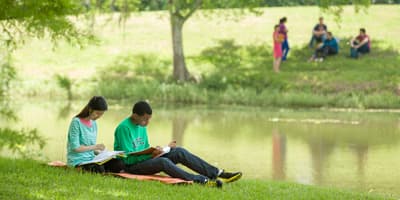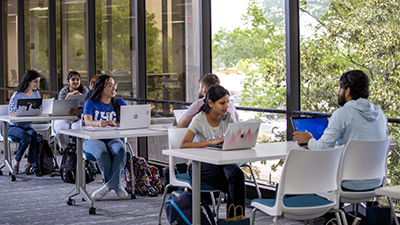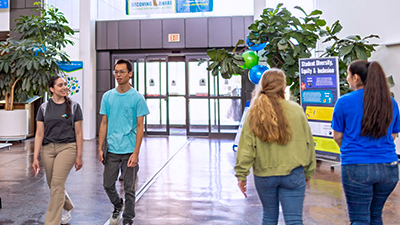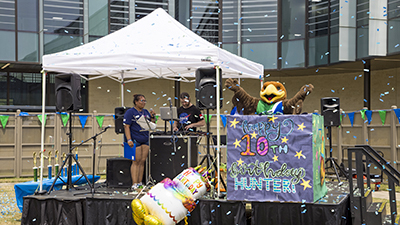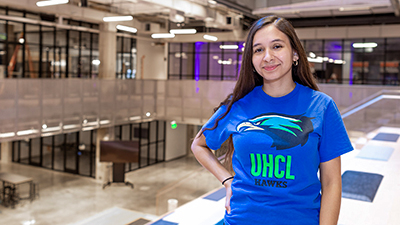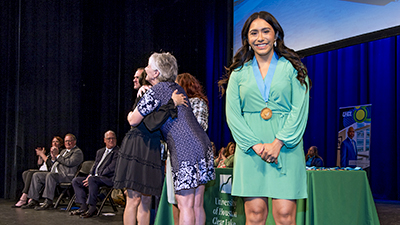Black History Month: NASA astronaut, UHCL alum talks dreams, goals, success
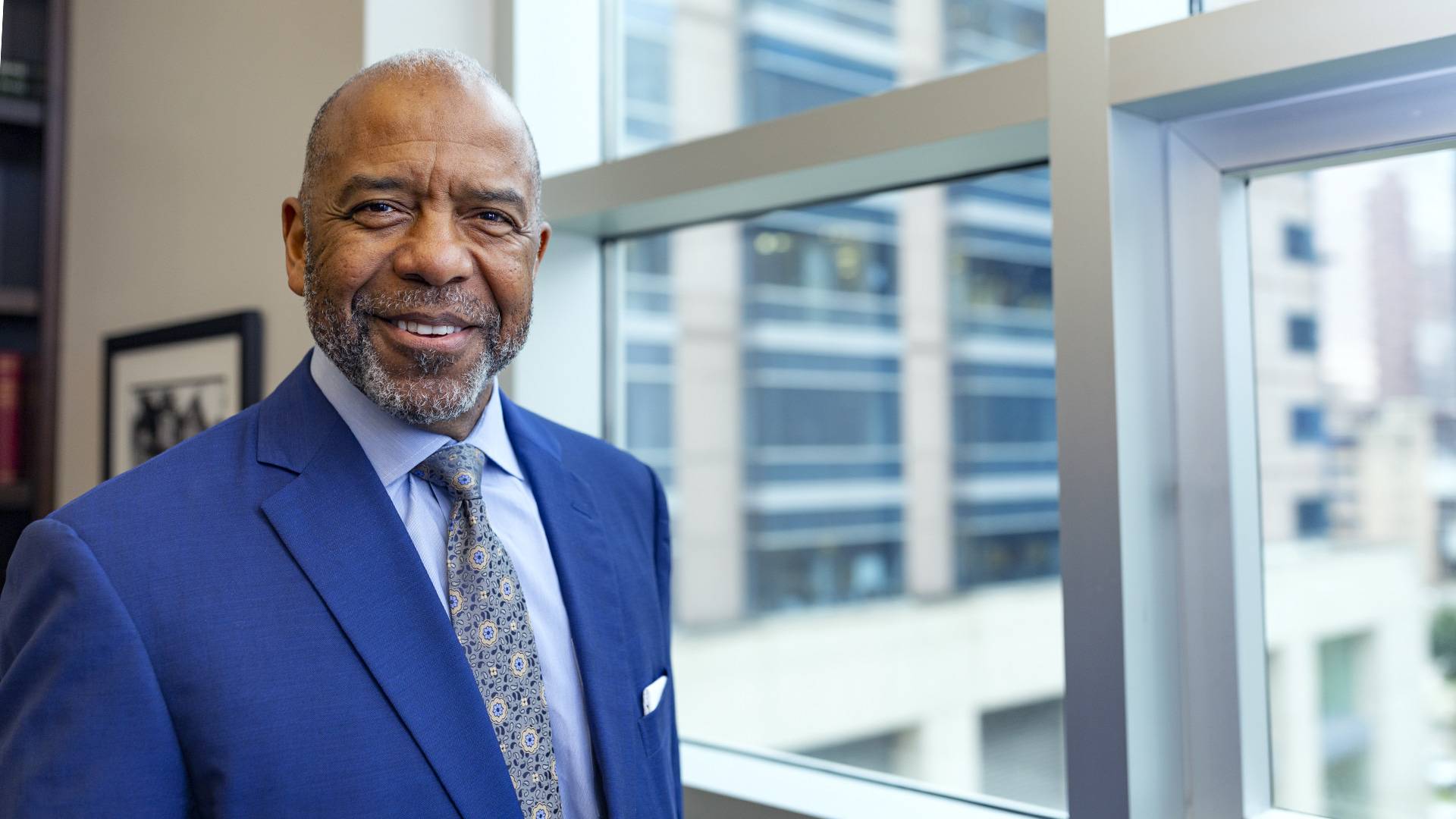
Life is full of challenges, but University of Houston-Clear Lake Distinguished Alumnus Dr. Bernard Harris, a former NASA astronaut who made history as the first African American to perform an extra-vehicular activity, said the key to moving beyond complex problems is simple: everybody needs to have a dream.
“The first task of any individual is to discover who they are,” Harris said. “People think having a dream or setting goals is easy, but there are so many ups and downs in life. I had a lot of them, and I saw them as stepping stones. They were the challenges to make me better.”
The obstacles in Harris’ life came early — at age 6, his parents divorced. “I was raised on Houston’s west side,” he said. “Today that area is called The Heights and it’s a great place to live, but back then, it was a very poor neighborhood. My father left the service and didn’t have a high school education, but my mother had her degree from Prairie View A&M University.”
The first thing his mother taught him, he said, was that education brought opportunity. “If you have an education, you have options. Without an education, your options are very limited,” he said. “When my family break-up occurred, she was able to exercise her options. We were transported from Houston to the Navajo Nation (a territory in Arizona and New Mexico), where my mother taught for the Bureau of Indian Affairs.”
The change was a godsend for Harris and his two siblings, because they were removed from the restricted environment of the inner city. “We were in a land where I could imagine anything I wanted to do,” he said. “I would sit out on a plateau not far from the house and watch the sun go down. It was the largest Navajo reservation in the country, away from all the lights. When the sun went down, the heavens opened. I saw all the stars in the galaxy before my eyes.”
Experiencing the wonder of the heavens was the first of many turning points in Harris’ young life. “Another pivotal moment for me happened when I was 13 and Neil Armstrong landed on the moon,” he said. “When I saw that, the first real dream I wanted to accomplish was to become an astronaut.”
Looking up
There were almost insurmountable obstacles in the path of a young African American man wishing to achieve this particular dream, and Harris said that in those days, the country truly did see things in terms of black and white. “For a young black boy to look at the TV in those days, and desire to follow in the footsteps of those great men, that was truly a leap of faith,” he said. “I did not have a strong male role model when I was a boy. It was tough to stay on track.”
Harris said that much of the key to success was about adapting to circumstances and maintaining the right attitude. “I told myself that even if I didn’t see someone in space that looked like me, I will be the first,” he said. “At every step of life when I was advancing, I had set a goal that required me to accomplish this.”
Growing up on a reservation helped cultivate his curious, exploring nature. “We explored the mountains to see what is on the other side,” he said. “Looking up at the heavens made me very curious to explore them, and the people who were doing that were astronauts. So I had to be one, too.”
Flying above expectations
In high school, Harris said he found out that medical doctors were involved in the space program at NASA. “That was another godsend for me, because I knew I liked helping people,” he said. “Knowing there were doctors participating in the space program enabled me to put two separate goals together. I said I would become a medical doctor who would travel in space. Joe Kerwin, the first physician to be selected for astronaut training, served as mission specialist for the Skylab 2 mission, showed me it was possible.”
Still, Harris said, there were many moments along the way that felt overwhelming and he considered giving up. “I was in college and I took organic chemistry and physics and a lot of really tough courses,” he said. “If I made a B, I panicked that I might not get into medical school because my grades weren’t good enough. I did qualify, but talk about tough courses! It gets so much tougher, and I was in classes with top students who were competing against each other.”
Then, in astronaut training school, Harris had to learn how to fly a jet. “I was already a private pilot, but only a fixed-wing pilot, so I had to learn to fly a military jet that traveled close to the speed of sound,” he said. “Those of us who are people of color feel a need to do well, because there are a lot of negative stereotypes to contend with. There were many challenges, but you have to step up.”
Harris was selected by NASA in 1990 and became an astronaut in 1991. He was the first African American to perform an extra-vehicular activity during the second of his two Space Shuttle flights. Between the two missions, he logged almost 440 hours in space, and traveled almost 7 million miles in space.
He completed his MBA at UHCL in 1999.
Education is key
With technology driving almost all aspects of our personal and professional lives, Harris said, it’s critical for all high school graduates, regardless of their ethnicity, to realize that continuing their education is the way they can take care of themselves, their families, and accelerate their personal growth and wealth.
“Because technology is at the forefront of everything, it makes sense to get educated in a STEM field,” he said. “The most lucrative jobs are in those fields. I would advise anyone to find a field that is relevant to them, and anyone from a disadvantaged background, it’s even more important that you get educated. You’re competing with domestic and foreign students who are all looking for the American dream.”
Continuing to dream and to be self-motivated will lead to success, Harris said. Today, he has combined his dreams of becoming a physician and an astronaut and put them into yet another dream — investing in medical technology companies. He is the CEO of his own company, Vesalius Ventures, a management team of experts in telemedicine and business.
“Even if you’re a first-generation student and you don’t think college is for you, it’s important to realize that without education, it is harder to move forward,” he said. “No matter where you come from, you can advance yourself and your family by having a goal and finishing your education.”
Learn more about Dr. Bernard Harris in the video interview online.
